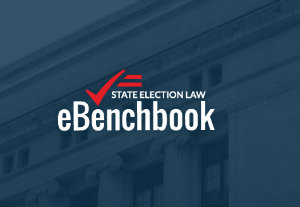Election Law Program's eBenchbook project adds Nevada and North Carolina election codes to its online database
Media Contact: Reiko Dogu, Election Law Program Manager, elect@wm.edu
Wondering what the Virginia election code has to say about ID at the polls? Want to know how Florida and North Carolina election statutes accommodate hurricanes? Curious how Nevada statutes treat third-party candidates? In advance of the November 6, 2018, election, the Election Law Program, a joint project of William & Mary Law School and the National Center for State Courts, is proud to add to its collection of online state election "eBenchbooks" available at https://eBenchbook.wm.edu. The new update adds Nevada and North Carolina codes to the platform, as well as text-only codes from all remaining states. These additions present users with three stages of eBenchbook development. The first stage houses just the text of the state election code. The second stage adds browsing menus, a search bar, and supplemental materials to each statute, such as case law and regulations (see Nevada and North Carolina for examples). The final stage "full" eBenchbooks incorporate in-text annotations from a bipartisan group of in-state election experts who annotate state election statutes on an ongoing basis. These annotations provide context for understanding how election laws operate in Colorado, Florida and Virginia.
In advance of the November 6, 2018, election, the Election Law Program, a joint project of William & Mary Law School and the National Center for State Courts, is proud to add to its collection of online state election "eBenchbooks" available at https://eBenchbook.wm.edu. The new update adds Nevada and North Carolina codes to the platform, as well as text-only codes from all remaining states. These additions present users with three stages of eBenchbook development. The first stage houses just the text of the state election code. The second stage adds browsing menus, a search bar, and supplemental materials to each statute, such as case law and regulations (see Nevada and North Carolina for examples). The final stage "full" eBenchbooks incorporate in-text annotations from a bipartisan group of in-state election experts who annotate state election statutes on an ongoing basis. These annotations provide context for understanding how election laws operate in Colorado, Florida and Virginia.
The eBenchbook project strives to make state election law more transparent, provide judges with meaningful context for election statutes, and provide opportunities for election law experts-who often find themselves on opposite sides in court-to clarify the meaning of state election statutes outside the context of a live election dispute. The eBenchbook project aims to provide a tangible resource to judges hearing election cases and to help journalists and members of the public understand how state election laws operate.
"Election litigation, once a rarity, has become increasingly common since Bush v. Gore. The Election Law Program's eBenchbook is a welcomed resource for judges deciding election-related cases," explains the Hon. Terry Lewis, a Leon County, Florida circuit judge who played a central role in Bush v. Gore in 2000. Whether you are a judge, a lawyer, a journalist, or a citizen who wants to know more about the law of elections, we welcome you to explore the site to see how election laws help to shape the contours of our democracy.
Interested in an eBenchbook for your state? Contact us at ebenchbook@wm.edu for information about adding your state to this resource.
To explore the election law eBenchBook, visit ebenchbook.wm.edu.
About William & Mary Law School
Thomas Jefferson founded William & Mary Law School in 1779 to train leaders for the new nation. Now in its third century, America's oldest law school continues its historic mission of educating citizen lawyers who are prepared both to lead and to serve.
Save